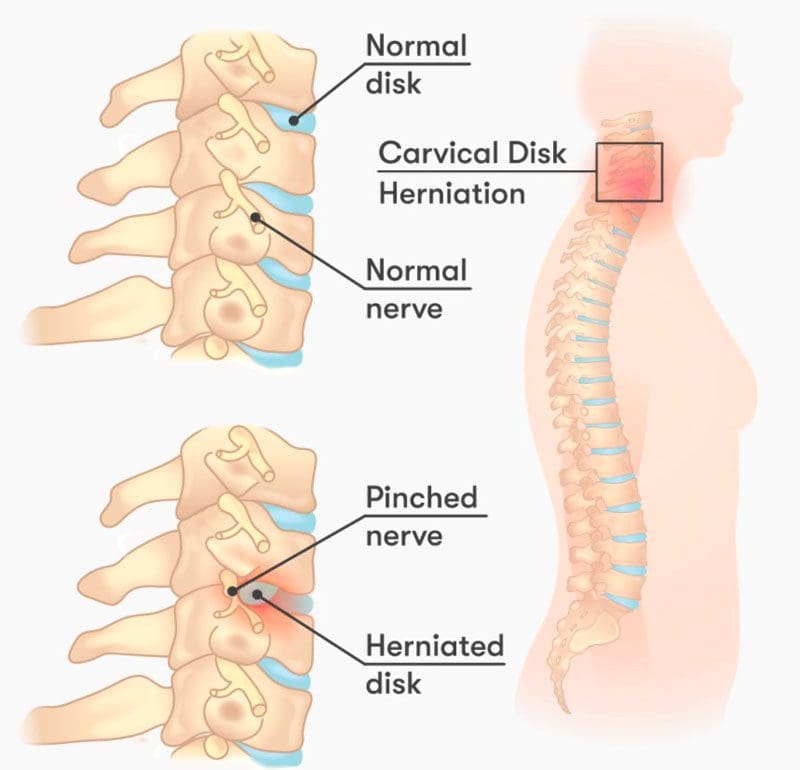A pinched nerve may not feel like it is healing. This is because of the soreness, aches, discomfort, and tingling feelings/sensations around the affected area. This could be the neck, shoulder, arm, hands, back, legs, and feet. However, when the achiness and tingling move around and shift, it is a sign of the pinched nerve healing.

Amount of Time For Pinched Nerve Healing
Waiting for the nerve to heal is not a recommended treatment option, as most pinched nerves do not fully recover on their own. A pinched nerve usually takes around six weeks to heal with proper treatment. The longer the nerve stays pinched, the more likely there will be permanent damage. To keep the pinched nerve from returning and getting worse, individuals are recommended to incorporate a pre-habilitation plan that involves continuing rehabilitation exercises to strengthen and keep the muscles, ligaments, and nerves loose, and adjusting posture, work, exercise, and diet habits to prevent re-injuring the nerve or cause new injury/s.
Common Nerve Sites
Nerves run throughout the body, so it’s possible to experience a pinched nerve anywhere. The most common pinched nerve sites occur at joints where there is constant movement. These areas include:
- Neck
- Shoulders
- Lower Back
- Arms
- Hands
- Feet
Healing Signs
Individuals often believe that their pinched nerve is getting worse because of soreness, aches and pains, and weird sensations. When the pain stays in one area, that could be a sign that the nerve has not been fully stretched/released and/or that there is still compression taking place. Treatment and healing include feeling the symptoms but in a different way. The symptoms will move up, down, or around depending on where the pinched nerve is. Treatment takes the nerve/s and stretches/elongates them, but the pinch created a nerve crimp, crease, fold that wants to return to the pinched position. This is why continued treatment and stretching are recommended, as a spasm, trauma, or some awkward movement can cause the nerve to re-fold to the pinched position or cause a whole new pinch.
Chiropractic Release
Chiropractic treats pinched/compressed nerves with several therapeutic modalities. These include:
- Body Adjustments
- Flexion-distraction
- Therapeutic massage
- Traction
- Inversion
- Laser therapy
- Ultrasound
Combined, these methods can help heal pinched nerves and keep them from recurring.
Body Composition
Skeletal Muscle
Skeletal muscle is a major muscle group. These muscles are attached to the bone by the tendons. Skeletal muscles incorporate nerves, blood vessels, and connective tissue to operate as a unit. Each skeletal muscle consists of cells that come together that form bundles of skeletal muscle fibers.
- Strength training stimulates the muscle fibers. When combined with proper nutrition causes hypertrophy/muscle growth.
- Muscles contract and shorten to pull bones and joints, allowing body movement.
- The nervous system signals the nerves in the muscle/s and triggers these contractions.
- Skeletal muscle helps the body:
- Maintain posture
- Generate body heat
- Stability to the bones and joints
The information herein is not intended to replace a
one-on-one relationship with a qualified health care professional, licensed
physician, and is not medical advice. We encourage you to make your own health
care decisions based on your research and partnership with a qualified health
care professional. Our information scope is limited to
chiropractic, musculoskeletal, physical medicines, wellness, sensitive health
issues, functional medicine articles, topics, and discussions. We provide and
present clinical collaboration with specialists from a wide array of
disciplines. Each specialist is governed by their professional scope of
practice and their jurisdiction of licensure. We use functional health &
wellness protocols to treat and support care for the injuries or disorders of
the musculoskeletal system. Our videos, posts, topics, subjects, and insights
cover clinical matters, issues, and topics that relate to and support, directly
or indirectly, our clinical scope of practice.* Our office has made a reasonable
attempt to provide supportive citations and has identified the relevant
research study or studies supporting our posts. We
provide copies of supporting research studies available to regulatory boards
and the public upon request.
We understand that we cover matters that require an
additional explanation of how it may assist in a particular care plan or
treatment protocol; therefore, to further discuss the subject matter above,
please feel free to ask Dr. Alex
Jimenez or contact us at 915-850-0900.
Dr.
Alex Jimenez DC, MSACP, CCST, IFMCP*, CIFM*, ATN*
email: coach@elpasofunctionalmedicine.com
Licensed in: Texas & New Mexico*
References
Bowley, Michael P, and Christopher T Doughty. “Entrapment Neuropathies of the Lower Extremity.” The Medical clinics of North America vol. 103,2 (2019): 371-382. doi:10.1016/j.mcna.2018.10.013
Campbell, W. “Diagnosis and management of common compression and entrapment neuropathies.” Neurologic clinics vol. 15,3 (1997): 549-67. doi:10.1016/s0733-8619(05)70333-9
England, J D. “Entrapment neuropathies.” Current opinion in neurology vol. 12,5 (1999): 597-602. doi:10.1097/00019052-199910000-00014
Kane, Patrick M et al. “Double Crush Syndrome.” The Journal of the American Academy of Orthopaedic Surgeons vol. 23,9 (2015): 558-62. doi:10.5435/JAAOS-D-14-00176




